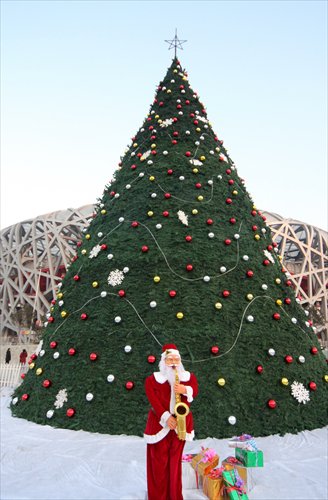HOME >> METRO BEIJING
Christmas with Chinese characteristics
By Xie Wenting Source:Global Times Published: 2015-12-14 18:38:01
How China celebrates the holidays

A Santa Claus statue holding a saxophone stands in front of the Beijing National Stadium. Photo: CFP
When Ivan Blinderman took a stroll along Chang'an Avenue last Saturday night, he was surprised to see so many Christmas lights and signs covering the fronts of stores and malls along the avenue."Those ones say 'Merry Christmas,' but in the US, as we have many religions, a lot of our holiday greetings are more general," said Blinderman, who comes from the US and has been living in China for seven years. "For example, we'll say 'seasons greetings,' instead of Merry Christmas. And only in Christian homes do people put up Santa stickers."
Although Christmas is not a national holiday in the Chinese mainland, that hasn't stopped people's enthusiasm for engaging in a little holiday spirit. And for the many expats who live here, the Chinese way of celebrating Christmas has its own unique characteristics.
Dan Friedman, an American working in the financial industry who has been living in China for over a decade, told Metropolitan that "Christmas traditions have been adapted as they get imported into China."
According to Friedman, one difference is that in the West, Christmas is traditionally a religious holiday, with a long history of customs based around the family and religious services. In China, meanwhile, Christmas is largely oriented around gift-giving and consumption.
"China obviously doesn't have the same historical and religious background, so the religious aspects won't have the same resonance in Chinese society as a whole," he said.
According to a report from Chinese news portal guancha.cn in 2014, only 1.7-2.9 percent of the total population in China believes in Christianity.
One uniquely Chinese way of celebrating Christmas is giving away apples on Christmas Eve, a tradition that originated from the fact that the Chinese word for "apple," pingguo, sounds like the Chinese word for "Christmas Eve," ping'an ye. Apples are also viewed as a "peaceful" fruit, as their name further resembles the Chinese word for peace, ping'an.
Last year, the Xinhua News Agency reported a student at Chongqing University of Posts and Telecommunications sold more than 4,000 apples in the five days prior to Christmas, making a profit of more than 10,000 yuan ($1,549).
"Christmas is commercialized in China, much like other Western festivals in China," said Blinderman.
Ma Zhichao, a researcher with the Shanxi Academy of Social Sciences, told Xinhua in 2012, "It was after 1990 that Chinese people began celebrating Christmas, as it grew in popularity along with China's mounting economic development and consumption culture."
In a 2013 post on Reddit China, an online community dedicated to all things China, a foreign Net user listed three things that he found odd about the Chinese way of celebrating Christmas: cellophane-wrapped "Christmas apples," festive wands topped by plush, winter-themed figurines and the fact that display Santas always seem to be playing saxophones.
Blinderman has an answer for the last one - the reason Chinese people associate Santa and saxophones is because both are imported products from the West.
Gao Wei, a Beijing-based expert on folk culture, said, "It's understandable that Chinese people have adapted the traditions of Christmas to meet their own needs. As most Chinese people don't have a religious faith, we have another motivation for celebrating Christmas: having fun and giving gifts."
However, China is not the only country to build on other cultures' holidays, Gao points out. America, for example, transformed All Hallow's Eve, a pagan holiday honoring the dead, into Halloween, a carnival-like festival where people dress up and collect candy.
As most of the people in China who celebrate Christmas are of a younger generation, Gao noted it is necessary to promote traditional Christmas values like benevolence and sharing among them.
"The church and the community should do more work and organize activities to teach people about the cultural background of Christmas and deepen their understanding of its core values," he said.
Posted in: Metro Beijing